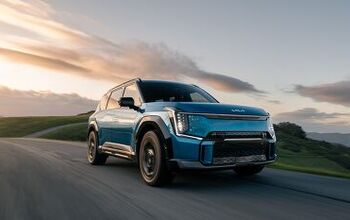Pencil-Necked Finance Dweebs Suggest Anyone Making Six-Figures Should Only Buy a $15,000 Car

Look, we’re all for a pinch or two of financial prudence around here. Springing for luxury items just isn’t in the cards for most of us, despite the lavish recompense* deigned upon us by our corporate overlords in Downtown Canada. (*note: the recompense isn’t actually lavish at all).
But even we feel comfortable calling out moronic fiscal advice when we see it. Case in point – a post on a website called Investopedia suggests that anyone making $100,000 per year should spend no more than roughly $15,000 on a car.
And, yes, the post seems to have been recently updated, with a dating of December 2023 and interest rates grounded in the current (horrible) reality we find ourselves. In order to reach this out-of-touch conclusion, the killjoys at Investopedia start with an assumption that one should limit their transportation expenses to 10 percent of an annual salary, including insurance, fuel, maintenance, and the car payment itself. Beyond that, they suggest making a down payment of at least 20 percent and financing the thing for no more than four years.
At the gross income of $100,000 annually, this shakes out to $10,000 per year or about $833 per month. Setting some variables in this equation, they propose a monthly insurance rate of $147, fuel costs of $260 per month, and maintenance pegged at $95.50 per month (about 10 cents per mile). Simple math leaves is with $330.50 for a car payment. To slide in at that figure over 48 months at 8.3 percent interest with 20 percent down, Investopedia suggests a total purchase price for your shiny new car – including taxes and whatever other fees a dealer feels like charging that day – at just $16,687.
Sixteen thousand, six hundred and eighty-seven dollars. On a car. In this economy whilst making a hundred grand. We’ll let that recommendation sink in for a second. To be fair, Investopedia does recognize the current state of the car industry elsewhere in the post, pointing out the unfortunate reality that the average transaction price of a new vehicle in America is nearly 50 grand whilst the average used set of wheels is in the $26,500 ballpark.
In fact, I feel my headline figure of $15,000 is actually generous, since the $16,687 estimate includes dealer fees and taxes. The latter generally ranges between 4 and 8 percent depending on location in this county, while anyone who’s been inside a dealership in their life knows the propensity of the business office to try and pad purchase prices with various and sundry items of questionable value. Don’t take the TruCoat.
Moseying over to AutoTrader, we find a rogue’s gallery of cars on offer for that sum. A ’17 Jag XF with 88K looks nice but is sure to cost far more than 10 cents a mile in maintenance. Same goes for the myriad of decade-old BMW X5s and Merc C-Class sedans. A fifteen-year-old Ram 1500 with 131k in near-base trim is a depressing thought to have in the driveway whilst making $100,000 per year, as is the two-wheel drive Tundra with 149k from Obama’s first term. The newest option is a Mitsubishi Mirage, of course – though you do have a choice of sedan or hatchback.
So – how about it, B&B? Am I being too snobby? Should I be resetting my sights to fiscal prudence and reality instead of thinking that anyone making six-figures shouldn’t be poked into an econobox or knackered old pickup truck? Perhaps my thinking is a root of the problem that’s caused note terms to regularly crest 84 months and debt loads to skyrocket.
Nah. Who am I kidding? If I made $100,000 per year, I sure wouldn’t be tooling around in a 2016 Equinox.
[Image: Jonathon Weiss via Shutterstock]
Become a TTAC insider. Get the latest news, features, TTAC takes, and everything else that gets to the truth about cars first by subscribing to our newsletter.

Matthew buys, sells, fixes, & races cars. As a human index of auto & auction knowledge, he is fond of making money and offering loud opinions.
More by Matthew Guy
Latest Car Reviews
Read moreLatest Product Reviews
Read moreRecent Comments
- 28-Cars-Later "elections"
- Tassos Good job, Senile, Corrupt Idiot-in-Chief.And when Inflation doubles again under your failed watch, LIE again that it was .. 9% when you took office, while THE REAL inflation then was less than 2%!Disgusting imbecile....
- Wjtinfwb Glad to see Toyota hanging in there with sedans. It's a bit clunky looking but no worse than a new BMW 7-series at 1/3 the price. More power would be nice but Toyota is married to the Hybrid/4-cylinder configuration. As this package gets refined I expect it will be come the norm.
- Wolfwagen The last couple of foreign vehicle manufacturers that tried breaking into the U.S. Mainstream Vehicle Market had a very hard time and 1. Couldn't get past the EPA regulation side (Mahindra) or 2. had a substandard product (Vinfast).
- Midori Mayari I live in a South American country where that is already the case; Chinese brands essentially own the EV market here, and other companies seem unable to crack it even when they offer deep enough discounts that their offerings become cheaper than the Chinese ones (as Renault found when it discounted its cheapest EV to be about 15% cheaper than the BYD Seagull/Dolphin Mini and it still sold almost nothing).What's more, the arrival of the Chinese EVs seem to have turbocharged the EV transition; we went from less than 1% monthly EV market share to about 5% in the span of a year, and it's still growing. And if — as predicted — Chinese EV makers lower their production costs to be lower than those of regular ICE cars in the next few years, they could undercut equivalent ICE car prices with EVs and take most of the car market by storm. After all, a pretty sizeable number of car owners here have a garage where they could charge, and with local fuel and electricity prices charging at home reduces fuel costs by over 80% compared with an ICE car.

































Comments
Join the conversation
Update: The Rules Have Changed
So it turns out that (contrary to the advice of old farts like me) you should actually listen to the Helpful Guidance handed out at Your Local Bank and Borrow Borrow Borrow for that Questionable Degree but just be sure you are Playing For The Right Team and you shall be handed $75,000.
Long live Free Enterprise.
So close to 200 comments... 😉